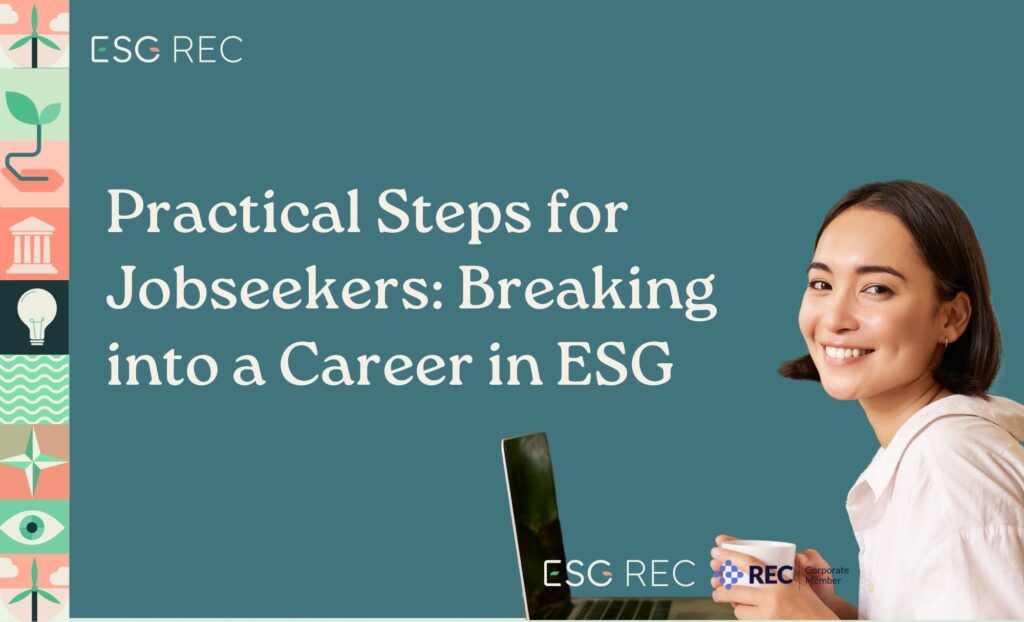
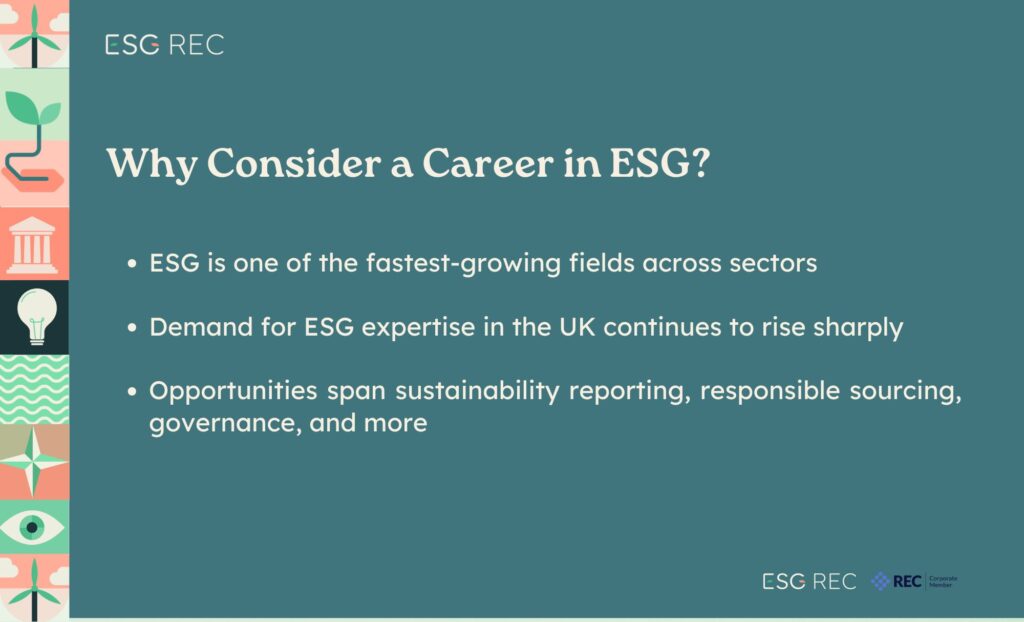
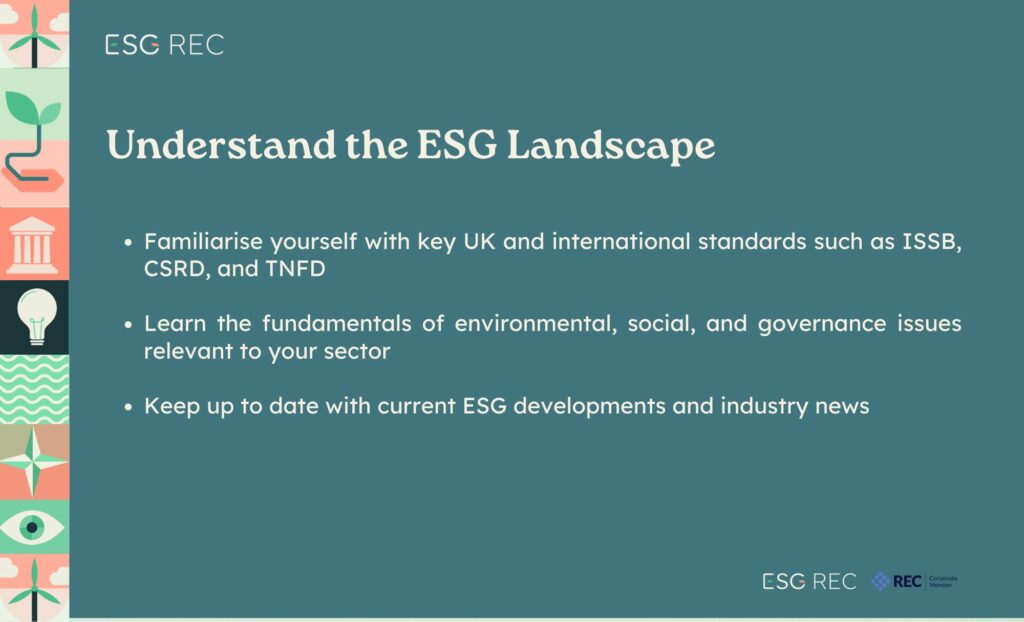
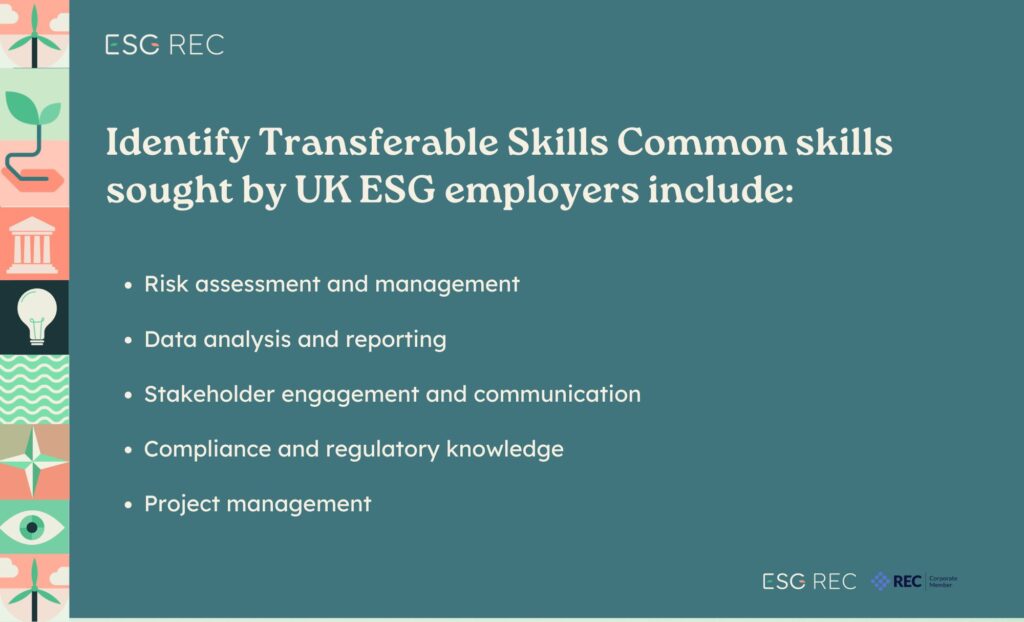
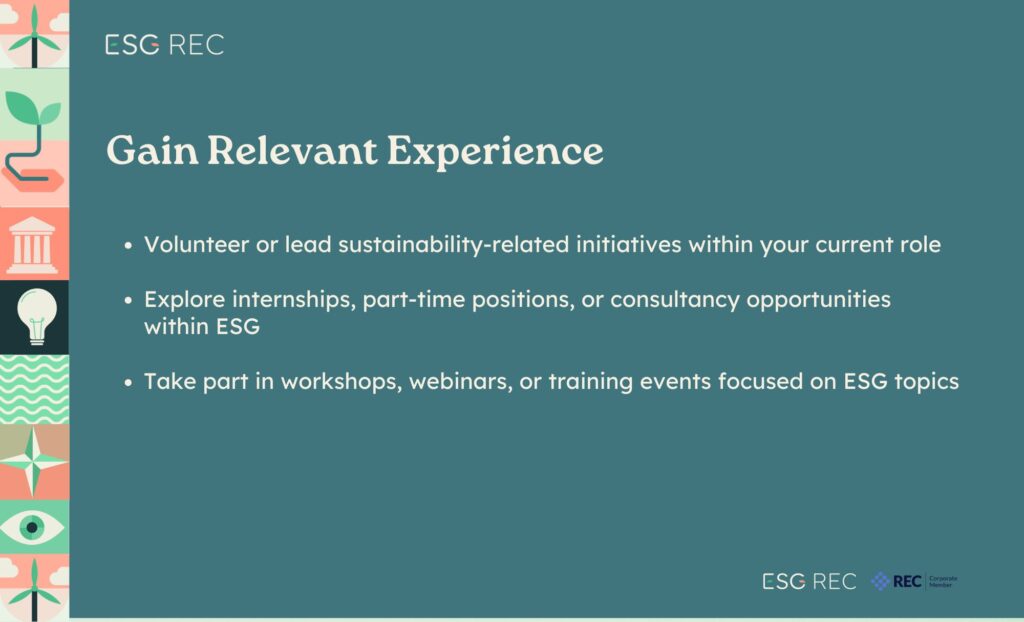
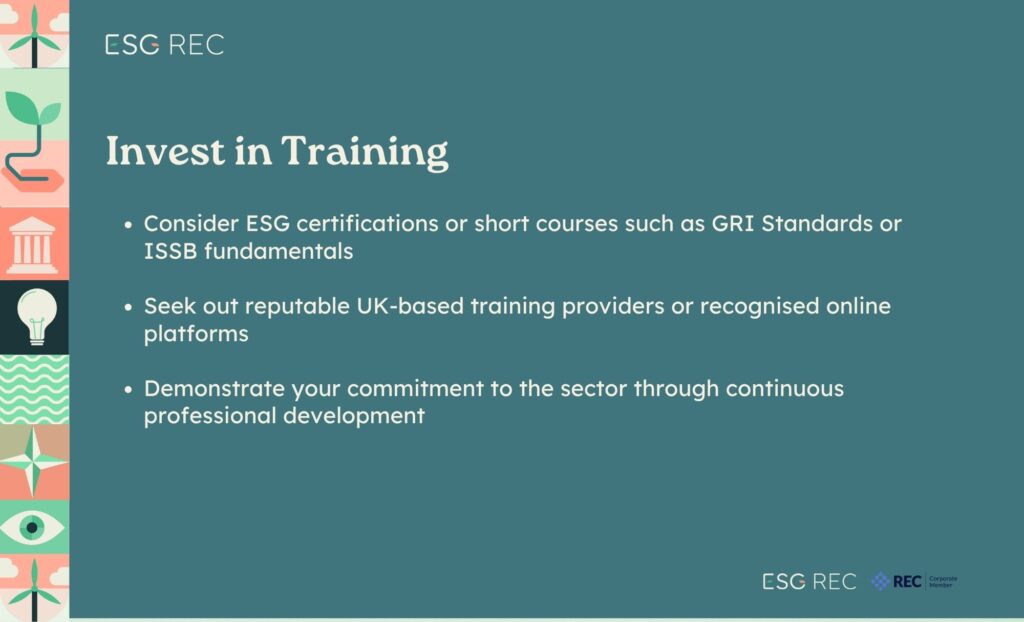
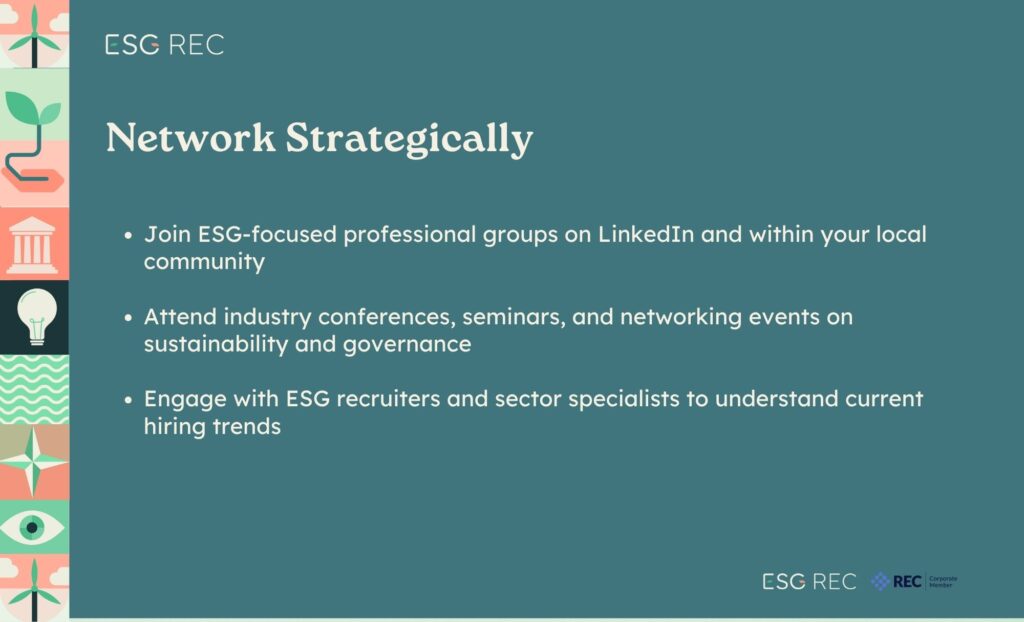
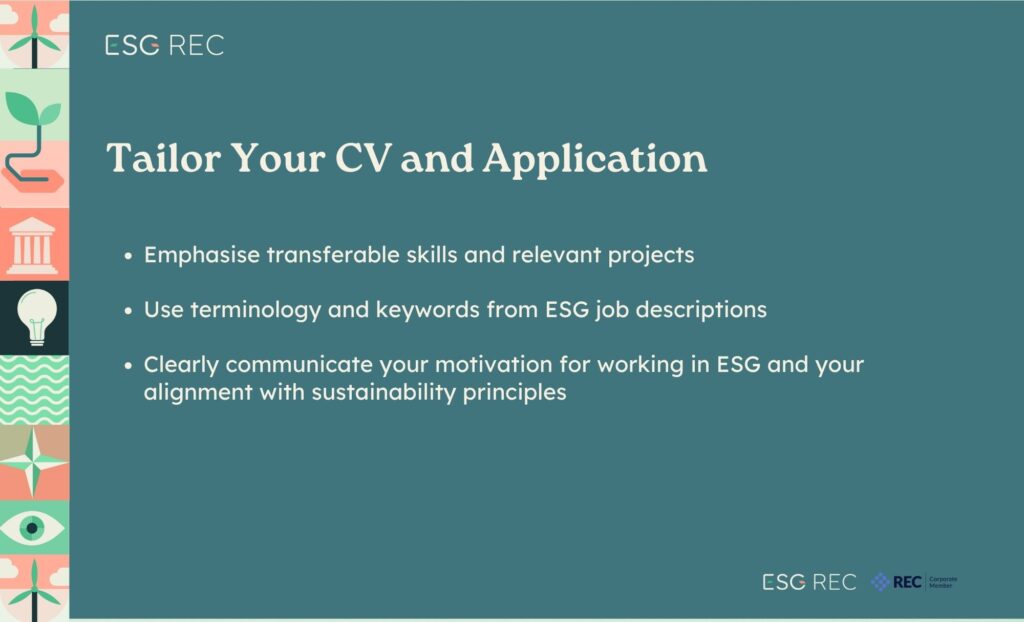
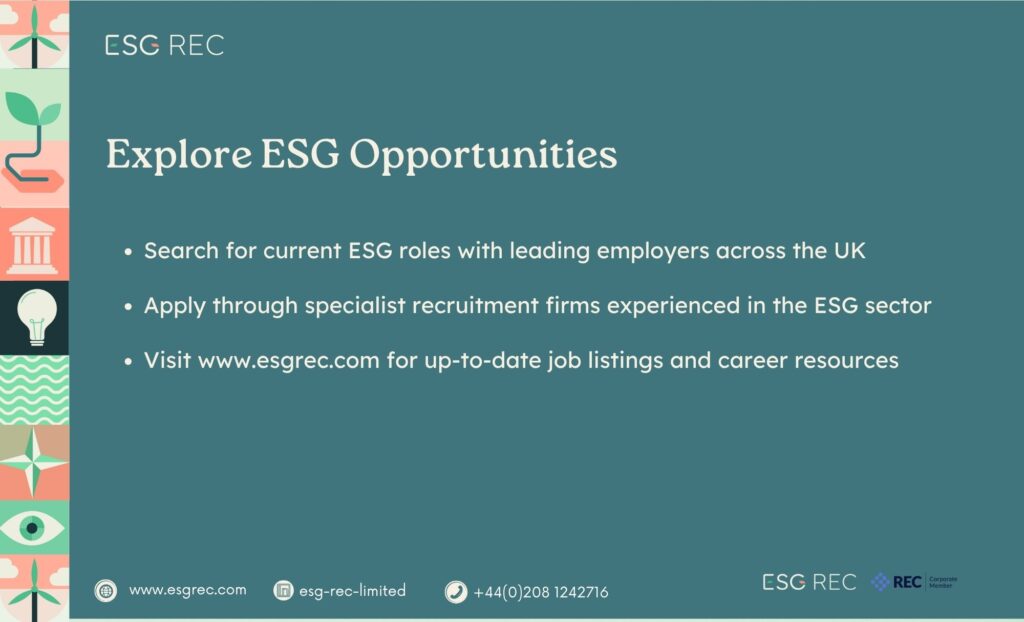









Until recently, ESG efforts were often skewed toward climate risk and emissions disclosures. But the social pillar is rising in urgency — particularly around human rights. This is being driven not just by values, but by binding regulations in the UK, EU, and beyond.
Many organisations are still catching up with what these changes mean for hiring and internal capacity. Legal teams are stretched, and compliance staff often lack social impact or grievance mechanism experience. ESG professionals with a grounding in human rights bring the practical knowledge needed to move from policy to implementation.
What’s Driving the Shift:
The Human Rights Value Add:
Professionals with human rights expertise bring critical capabilities to ESG teams:
Hiring for human rights, ethical trade, or responsible sourcing roles?
ESG REC works with experienced professionals ready to support your shift from compliance to impact. Connect with us at www.esgrec.com to know more
References:
As the ESG job market evolves, so do the ways professionals work. An increasing number of practitioners are exploring freelance or advisory paths, often driven by a lack of permanent opportunities and growing demand for specialised knowledge.
With many organisations still cautious about hiring and ESG candidates reporting a slowdown in full-time opportunities, it’s a good moment to reflect on what boards are truly looking for as they prepare for 2025.
The ESG function is undergoing a quiet transformation. It’s no longer seen as a reporting role or compliance necessity — boards are increasingly expecting ESG leaders to help steer corporate strategy, not just measure it. But as the market becomes saturated with CVs showcasing frameworks and reporting standards, a disconnect is emerging.
What Boards Are Prioritising:
Final Thought:
ESG leaders who combine technical expertise with commercial fluency and board-level influence will be best positioned for opportunities as hiring regains momentum later in 2025.
Looking to connect with organisations seeking ESG leaders like you?
Explore current opportunities or register your CV today at www.esgrec.com.
References:
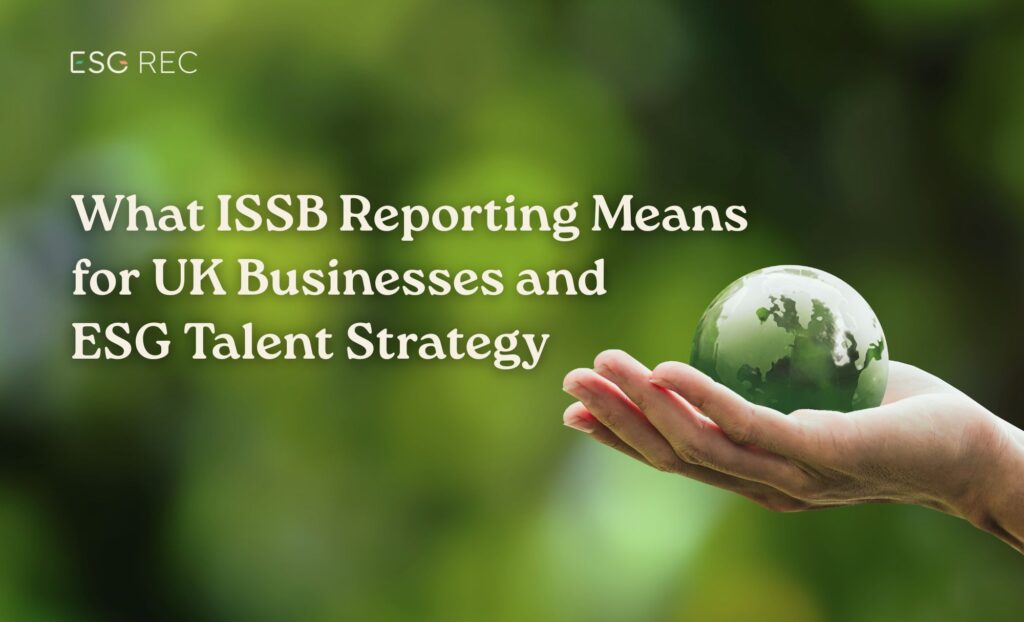
As the UK prepares to adopt ISSB-aligned sustainability standards, companies will need to respond not only with stronger reporting frameworks, but also with the right internal expertise. This article outlines key implications for teams, structures, and skills.
In 2024, the UK Government confirmed its support for the adoption of the International Sustainability Standards Board (ISSB) framework. This signals a shift toward more standardised and financially relevant sustainability reporting, aligned with global expectations1.
The ISSB has issued two core standards:
These standards aim to provide a consistent, comparable baseline for sustainability disclosures. The UK intends to begin implementing ISSB-aligned disclosures through the Sustainability Disclosure Standards (SDS), with initial reporting likely to begin from 2025 for certain companies2.
How ISSB Differs from Existing ESG Frameworks
While many UK businesses are familiar with voluntary ESG frameworks such as TCFD, CDP, or GRI, the ISSB introduces a number of changes:
This is a step change in the way companies are expected to treat climate and sustainability issues — moving from narrative to financially material reporting.
Shared Accountability Across Teams
One of the more complex challenges of ISSB implementation lies in accountability. Unlike traditional ESG reporting, which may sit solely with a sustainability team, ISSB-aligned disclosures require collaboration between multiple business functions.
| Function | Area of Responsibility |
|---|---|
| Finance | Integrating ESG risks and metrics into investor-facing financial reports |
| Sustainability | Providing data, context, and risk assessments |
| Risk and Audit | Ensuring internal controls and assurance processes |
| Legal and Compliance | Supporting regulatory alignment and governance |
| Executive Leadership | Overseeing strategic direction and decision-making |
Many companies are now beginning to map internal roles and responsibilities to ensure they can meet the requirements in a coordinated and reliable way.
Evolving Talent Requirements
The increasing complexity and rigour of sustainability reporting has led many organisations to evaluate whether they have the right internal skills to meet ISSB expectations.
Some of the roles likely to play a key role in ISSB readiness include:
The ability to interpret materiality, manage complex data, and communicate ESG performance in financial terms is becoming essential.
Questions to Consider
As organisations begin to prepare, several key questions can help guide planning:
Early planning, cross-functional collaboration, and upskilling efforts will all contribute to a smoother transition.
Preparing for What Comes Next
ISSB reporting marks a new phase in ESG disclosure — one where regulatory expectations are rising, and where the quality of reporting will reflect directly on a company’s credibility with stakeholders, investors, and regulators.
The focus now must be on building integrated, skilled teams that can work across disciplines and deliver high-quality, decision-useful disclosures.
If your organisation is reviewing internal capacity to meet ISSB standards and would like to discuss talent requirements or hiring options, feel free to reach out to us for a consultation.
You can contact the ESG REC team at info@esgrec.com.
References:
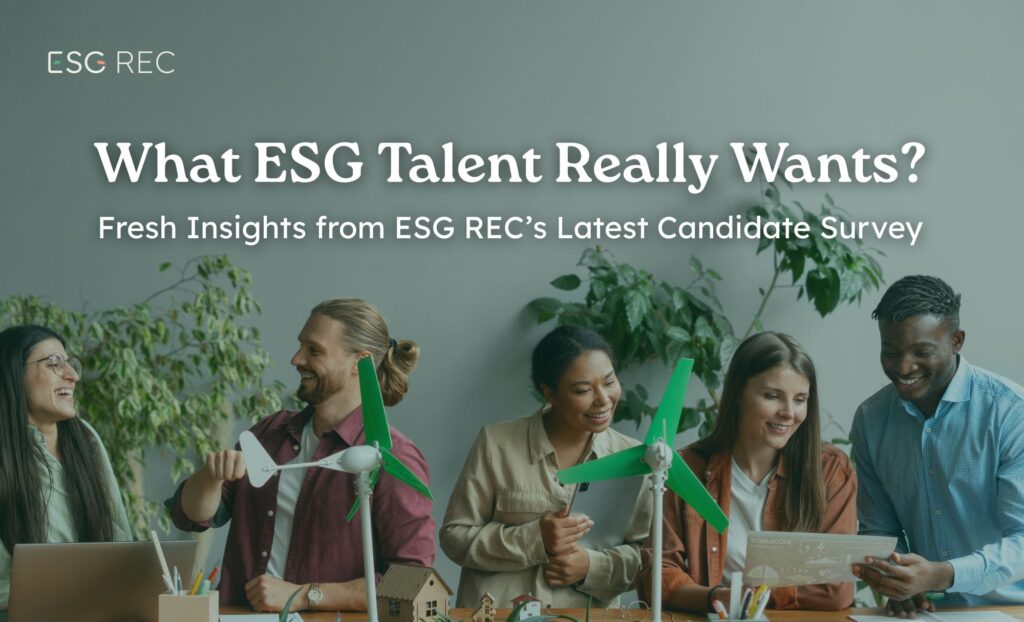
As ESG and sustainability continue to reshape industries across the UK, organisations face growing challenges in attracting and retaining the right talent. To understand what drives today’s ESG professionals ESG REC surveyed over 200 candidates from the UK’s sustainability sector who are currently actively seeking new opportunities— ranging from entry-level to senior roles.
The findings reveal what motivates career choices, what makes candidates accept job offers, and how companies can better align their recruitment strategies with talent expectations in this fast-evolving market.
Salary remains the top motivator for nearly half of respondents — which comes as no surprise in a competitive job market. However, the survey shows a shift towards broader career priorities:

Insight: To attract and retain ESG talent, organisations need to appreciate that a competitive salary on its own is no longer enough. Candidates expect genuine flexibility in working arrangements and clear prospects for professional development. Employers who provide this will be better placed to engage and keep high-quality talent for the long term.
Beyond salary and benefits, the recruitment experience itself strongly influences candidates’ decisions to accept roles:
Interestingly, factors like office tours or the physical workplace environment were less significant.

Takeaway: Transparent and people-focused recruitment processes are absolutely essential, particularly within the ESG sector where an organisation’s values and culture carry significant weight.
Candidates want to feel that they are joining a workplace that genuinely lives its sustainability commitments and treats people with respect and openness throughout the hiring journey. Employers who prioritise clear communication, authentic engagement, and a human-centered approach will build stronger trust with candidates and ultimately attract professionals who are truly aligned with their mission and purpose.
Candidates considering ESG roles are looking for more than just a pay cheque; they want to see their prospective employer living the values they promote:
Attracting and retaining top ESG talent today requires more than offering competitive salaries. Candidates increasingly seek meaningful flexibility, clear opportunities for professional development, and a recruitment experience that reflects transparency and authentic values. Organisations that embed these principles within their hiring strategies will not only gain a competitive advantage but also demonstrate genuine commitment to ESG — aligning people, purpose, and performance.
For hiring managers, this means creating candidate experiences that truly resonate with sustainability-driven professionals and fostering workplace cultures that support growth and well-being. For candidates, it highlights the importance of finding employers who live their ESG values throughout every step of the hiring journey.
Discover how ESG REC can support your ESG recruitment needs, whether you’re hiring the best talent or developing your career in sustainability.
Visit www.esgrec.com today or email us at info@esgrec.com to find out more.
As ESG and sustainability continue to gain traction across UK industries, more professionals are looking to align their careers with purpose-driven work. The good news? Opportunities in ESG are growing. The challenge? So is the competition.
To stand out and secure your next role in this evolving field, it’s important to be strategic — not only about the roles you apply for, but also the platforms you use to find them. LinkedIn remains a valuable tool, but it’s not the only one at your disposal. Here’s how to make the most of LinkedIn and other platforms when exploring your next move in the ESG space.
1. Make Your LinkedIn Profile ESG-Ready
Your LinkedIn profile acts as your digital CV — and in many cases, your first impression.
Headline and Summary: Use clear, relevant keywords such as “ESG Analyst”, “Sustainability Consultant” or “Carbon Accountant” to help your profile show up in recruiter searches.
Experience and Achievements: Highlight real impact — e.g. “Delivered Scope 3 emissions analysis for a listed company” or “Supported ESG disclosures in line with TCFD recommendations.”
Skills and Training: Include ESG-related qualifications (such as IEMA, CFA ESG, or PRINCE2 for ESG projects), along with any specialist tools or frameworks you’ve worked with.
It also helps to follow sustainability leaders, comment on sector developments, and join ESG-related groups to stay engaged.
2. Look Beyond LinkedIn
While LinkedIn is an essential platform, casting a wider net gives you access to a broader range of opportunities — particularly in niche areas:
ESG REC: Visit www.esgrec.com/jobs for a curated list of ESG and sustainability roles across the UK and Europe.
EnvironmentJob.co.uk: A long-established job board focused on environmental and sustainability careers.
Guardian Jobs – Environment section: Especially useful for roles in local authorities, charities, and the public sector.
GreenJobs, Acre, Ethical Jobseeker: Specialist platforms for professionals in green industries and ethical sectors.
3. Stay Active and Connected
Many ESG opportunities are shared within networks before they reach public job boards. Being visible and active in the space gives you a competitive edge:
Attend ESG-focused webinars, panels, and career events.
Share your insights on LinkedIn to build credibility and showcase your interest in the sector.
Connect with peers, recruiters, and sustainability professionals working in areas you’re interested in.
4. Be Prepared to Move Quickly
In a growing but competitive market, timing matters. Make sure:
Your LinkedIn settings show you’re “open to work” (you can make this visible to recruiters only).
Your CV is tailored to each role, with an emphasis on outcomes and measurable ESG impact.
You’re ready with a concise “career story” that explains your ESG motivations and relevant experience.
Final Thought
Building a career in ESG requires more than passion — it also calls for visibility, credibility, and the right tools. By positioning yourself effectively on LinkedIn and using platforms designed for purpose-led roles, you’ll improve your chances of connecting with organisations that align with your values and aspirations.
Looking for Support in Your ESG Career Journey?
Whether you’re actively applying or just starting to explore opportunities in ESG, our team at ESG REC is here to help. Visit www.esgrec.com or drop us a line at info@esgrec.com to find out how we can support your next career step.
As the demand for ESG expertise continues to grow across the UK, organisations are under pressure to secure the right talent to drive their sustainability agendas. Yet in a competitive and rapidly evolving market, attracting and retaining ESG professionals is far from straightforward.
At ESG REC, we recently surveyed over 200 candidates actively seeking roles in the sustainability space to better understand what really matters to them when considering a new opportunity. The findings – which you can explore in our article What ESG Talent Really Wants offer practical insights into how organisations can stay ahead of the curve.
But understanding candidate preferences is just the beginning. The real opportunity lies in how hiring managers leverage this data to inform, refine, and strengthen their recruitment strategies.
Why Data Matters in ESG Hiring
Recruitment in the ESG sector can’t rely on assumptions or outdated approaches. Data-led hiring enables organisations to make better decisions from understanding which roles are proving hardest to fill, to identifying which aspects of a job offer are genuinely valued by candidates.
At ESG REC, we use candidate data every day to help clients fine-tune their job specs, adjust salary benchmarks, and improve the overall hiring experience. When data is embedded in your hiring strategy, it becomes much easier to attract candidates who align with your values, mission, and business objectives.
Turning Insights into Action
According to our latest candidate survey, three factors stand out: salary, flexibility, and professional development. These aren’t just perks – they’re priorities. If your job adverts and interview processes don’t reflect this, you may be missing out on top ESG talent.
It’s also important to track the more human aspects of your hiring process – such as how and when you communicate with candidates. Our survey found that consistent, transparent communication was one of the biggest influences on whether a candidate accepted a role.
Key Metrics Worth Monitoring
For those involved in ESG hiring, some of the most useful recruitment analytics to track include:
Application and conversion rates by role type
Time-to-hire and candidate drop-off stages
Source of best-performing candidates (e.g. LinkedIn, referrals, agencies)
DE&I performance across shortlists
Monitoring these metrics helps you identify what’s working, where improvements are needed, and how your recruitment strategy aligns with your wider ESG goals.
A Smarter, More Sustainable Approach
When hiring strategies are informed by data, they don’t just attract better candidates – they reflect a more mature, sustainable approach to people and culture. For ESG roles in particular, this is key: you’re hiring professionals who care deeply about impact, integrity, and values. Your recruitment process should reflect that.
Need Support with ESG Hiring?
If you’re currently hiring or planning to grow your ESG team, we’re always happy to share insights or offer guidance. ESG REC specialises in connecting organisations with skilled sustainability and ESG professionals across the UK.
Feel free to get in touch at info@esgrec.com or visit www.esgrec.com to see how we can support your hiring needs.
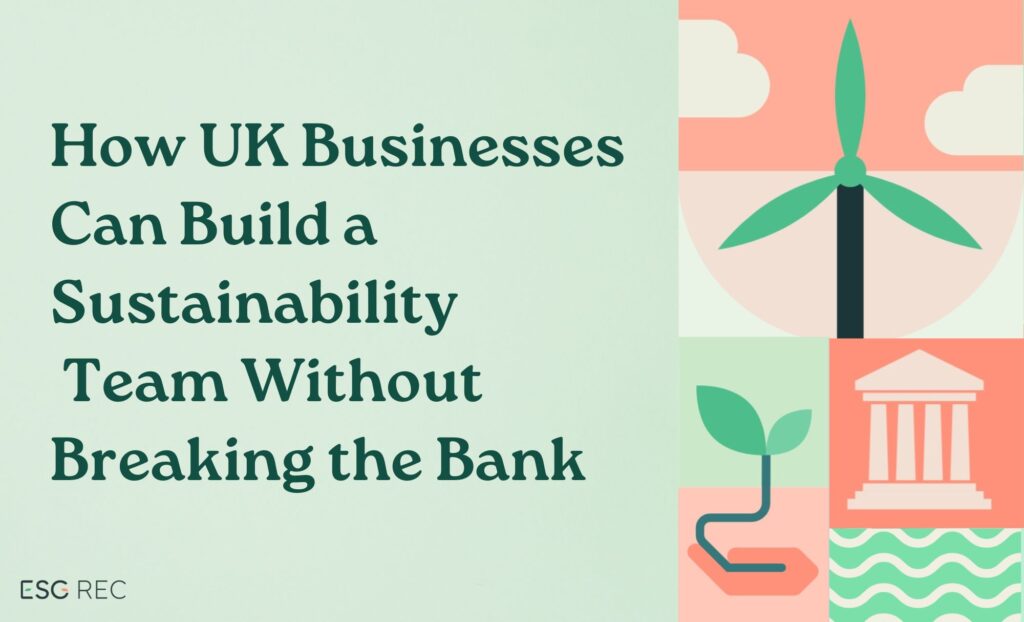
Sustainability is no longer a “nice to have” – it’s becoming essential for UK businesses, whether due to regulation, investor pressure, or simply staying competitive. But let’s be honest: not every business has the budget to build a dedicated team of ESG (Environmental, Social, and Governance) experts overnight.
So how do you start building a credible sustainability team without draining your budget faster than your office kettle?
1. Start With What You’ve Got
Many businesses already have untapped sustainability champions in-house. Think operations managers who are obsessed with efficiency, HR leads with a passion for wellbeing, or finance professionals who care about long-term impact. Upskilling your current staff with short courses like the IEMA Foundation Certificate or online options through FutureLearn can lay the groundwork at a fraction of the cost of hiring new heads.
2. Hire for Mindset Over Mastery
Not every role in a sustainability team needs a decade of experience in carbon accounting. When hiring, look for candidates who understand your industry and have a genuine passion for sustainability. Roles like Sustainability Coordinator or ESG Analyst can often be entry-level or cross-functional, especially with the growing pool of professionals switching into green careers.
Tip: Consider flexible roles – even part-time or freelance support – to test the waters.
3. Use External Expertise Strategically
Bringing in a consultant can feel like a luxury, but targeted short-term support can actually be cost-effective. A seasoned sustainability consultant can help you set a roadmap, advise on compliance (hello, SECR and TCFD!), and recommend tech solutions – without the long-term cost of a full-time hire.
4. Collaborate Across Your Supply Chain
You don’t have to do it alone. Engage suppliers, clients, and industry peers to co-create sustainability initiatives. Group workshops, joint carbon audits, or shared reporting tools can lighten the load – and the cost.
5. Tap into Grants and Free Tools
Did you know that many local councils and enterprise partnerships offer sustainability grants and advice? Check with your local Growth Hub, or explore tools like the Carbon Trust SME Guide for practical support.
Final Thought
Building a sustainability team doesn’t mean hiring a battalion of experts on day one. With smart planning, creative hiring, and a dose of collaboration, UK businesses of all sizes can take meaningful climate action – without needing a Silicon Roundabout-sized budget.
Need Support with Hiring for Sustainability Roles?
Whether you’re hiring your first ESG Coordinator or building out a net zero strategy team, ESG REC can help.
Email us at info@esgrec.com or visit www.esgrec.comto learn more.

In the face of the climate crisis, it’s time to put CSR and ESG firmly back on the business and social agenda — not as buzzwords, but as urgent and meaningful action.
We invite you to a compelling fireside chat with award-winning author and global speaker Sangeeta Waldron, where we’ll explore the intersection of climate, leadership, and legacy in today’s world.
Drawing on themes from her latest book, What Will Your Legacy Be? Conversations With Global Change Makers About The Climate Crisis, Sangeeta will reflect on:
✅ Why ESG is more critical now than ever
✅ The responsibility of businesses, communities, and individuals in shaping change
✅ Leadership, accountability, and resilience amid global uncertainty
✅ The wider political context and its impact on climate progress
✅ Practical solutions rooted in collaboration, community, and courage
About the Speaker:
Sangeeta Waldron is a multi-award-winning communications expert, bestselling author, and Climate Reality Leader trained by Al Gore. With a background that includes writing for government ministers, advising global brands and charities, and speaking internationally, she brings deep insight into climate, sustainability, and corporate responsibility.
Her latest book, What Will Your Legacy Be?, was launched in January 2025 and presented at Davos 2025. Sangeeta is also the founder of Serendipity PR & Media, and co-creator of The Green House Duo with Giles Trendle — a collaboration uniting sustainability, media, and communications expertise.
This is more than a conversation — it’s a call to action.
Whether you’re a business leader, policymaker, student, or engaged citizen — your voice and actions matter.
Register now to secure your place and join the conversation shaping a more sustainable future.